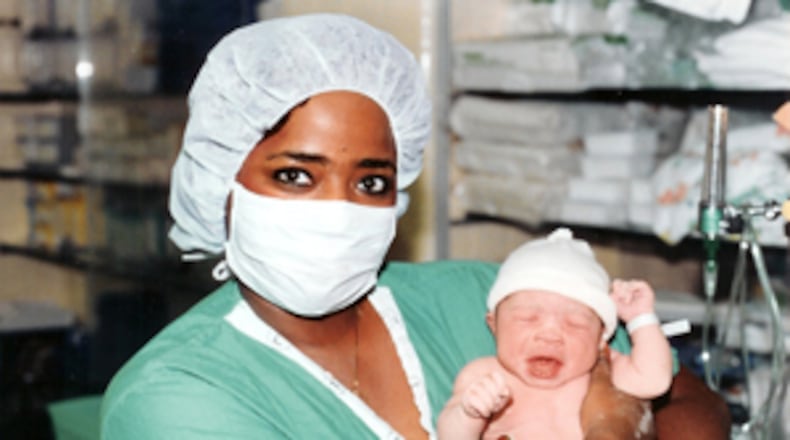After completing her residency at Emory University-affiliated hospitals, Dr. Melody McCloud had a singular desire. “I always wanted to have my own practice and hang out my own shingle,” said McCloud, an OB-GYN who has transitioned from active clinical care to lecturing nationwide on women’s health.
In 1985, McCloud became a trailblazer when she opened her practice, later known as Atlanta Women’s Health Care, PC. She was one of the few Black female OB-GYNs with a private practice in metro Atlanta and the only one in South DeKalb County, a predominantly Black area that was in dire need of obstetric services.
McCloud has taken her 40-plus years of knowledge on women’s health to the public with a new book released in January. “Black Women’s Wellness” (Sounds True, $27) is intended to be a guide for all women, but particularly women of color, as they navigate a medical environment that McCloud said has changed dramatically since she entered the women’s health care sector.
McCloud says that patients must be their strongest advocate in dealing with doctors, particularly doctors who may not fully assess the health needs of different ethnicities.
She has long been disturbed by the health disparities that leave women of color lagging in care and at greatest risk for conditions including heart disease, obesity and diabetes, maternal mortality, cancer and HIV and AIDS.
The first section of the book corresponds to those conditions, providing revealing statistics, terminology and definitions so that more women will have the language and confidence to walk into their doctors’ offices with questions at the ready. “I want to make sure patients are informed about the basic signs and symptoms of disease and to know the general elevated risks we face as Black and minority women,” she said.
Credit: Dr. Melody McCloud
Credit: Dr. Melody McCloud
Why have death rates for lung cancer increased for women while they have dropped for men? White women smoke at higher rates than Black women, but five-year survival rates for lung cancer is lower in Black people than white people.
The maternal mortality rate in the U.S. has more than doubled since 1987, but Black women and Native American women are two to three times more likely to die from pregnancy-related causes than white women, according to the Centers for Disease Control and Prevention.
There are many factors that contribute to these disparities, but addressing them requires that women have medical providers they feel comfortable consulting for preventative care.
Growing up in the Washington Heights neighborhood of New York City, McCloud loved going to the doctor. She was entranced by the smell of rubbing alcohol in the air and the knowledge that her doctor, a Black woman, was invested in her health.
“The initial inspiration I had to go into medicine was the fact that I had a Black female pediatrician when I was a little girl,” McCloud said. Seeing someone who looked like her doing the job she wanted to do taught her early lessons in shielding herself from the opinions of others. “I have learned not to let people define you to yourself,” she said.
McCloud was a latchkey kid raised by a single parent. She did not meet her biological father until she was 49 years old, after a search prompted by the difficulties she had relating to her mother. Growing up with limited family and succeeding despite the odds taught her a lot about the power of relationships in our lives, all of which she would bring to bear in her medical practice.
“In medicine, we help heal the body, but I apply those same principles to healing relationships,” McCloud said. Do no harm. Never underestimate how much someone hurts. Check vital signs regularly. Those are just a few pearls of medical wisdom that she invites readers to apply to real life.
In her new book, McCloud shares her lessons of resilience when discussing the impact of racism on Black women’s health, beauty standards, sexual health, love, marriage and finances. She even provides checklists for family medical history and a health questionnaire to complete and share with the doctor.
Her final lessons for a happier, healthier life read in rhyme: “Guard your garden, be well read, tend that body and sweat that head,” which equate to protecting your physical and emotional health, continuing to learn, feeding your body inside and out, and always exercising.
The book is a love letter to the women she has treated over the years and an effort to change the health of Black women, their families and future generations.
“For someone to entrust their body to you is such an honor,” McCloud said. “I always wanted to be the best OB-GYN I could be.”
“Black Women’s Wellness,” is part of that legacy.
Read more on the Real Life blog (www.ajc.com/opinion/real-life-blog/) and find Nedra on Facebook (www.facebook.com/AJCRealLifeColumn) and Twitter (@nrhoneajc) or email her at nedra.rhone@ajc.com.







